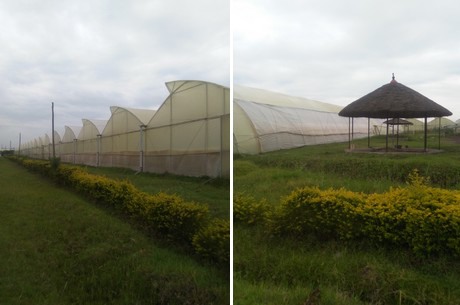
Bereket Adane at the BSI meeting at the FloraHolland auction in Aalsmeer. Approximately 75 percent of their roses are being supplied to the FloraHolland auction in the Netherlands and 35 percent is supplied direct through Rose Portal to countries all over the world.
Heavy rains
During this time of the year, Ethiopia has to deal with the rainy season that usually runs from June to Mid-September. This year, however, the rainy season is longer and heavier. "It already started at the end of April", says Adane. "And the rains are heavier than last year. Usually, on a monthly basis and in our region, we have to deal with 180 millimeters of rainfall in the rainy season. However, this year 248 millimeters of rain fell. I even heard that about four other flower farms have been flooded." According to Adane, the reason for these heavy rains is the El Niño and La Niña climate phenomena. "This year, we had El Nino and skipped a short rainy season, followed by El Nina, which is what we are experiencing at this very moment. This is what can explain the rain starting earlier and being heavier, and which might lead to a prolonged rainy season."
Decrease in production
Due to the heavy rains and cloudy days, the level of humidity is higher, which increases the occurrence of diseases like botrytis, downy mildew and powdery mildew. As a result, the production at the majority of the farms in Ethiopia decreased, and also at Dugda Flora. "Usually, during this time of the year, our production decreases by 20 - 30 percent, because of the rains and low season. However this year, the heavy rains made the production drop even further, by about 50 percent", says Adane.

Pictures showing cloudy day at 15:00 hr at Dugda FLora.
Higher prices
Fortunately, the prices are higher. "As there are less flowers on the auction, the prices increase. The prices are about 50 percent higher than they should be during this time of the year. These prices are almost as high as during Valentine's Day." In spite of these higher prices, Adane prefers last year's situation over this year's. "The production costs are the same as usual, but we have less products. And this price increase will not do enough of a job."
Roads are OK
According to Adane, the roads are still OK. "We do not have any problems with the roads. Last year a new highway was established, so our flowers arrive on time at the airport.''
One and half months to go
The rains are not finished yet in Ethiopia. It is forecasted that it will take another one and half month or even more. Then, the farms can increase their production again and Dugda Flora will enter the market with new varieties. "We are currently changing seven old varieties. Four of the new varieties are already planted and we are currently working on the other three varieties. Of course, these investments increase our current costs, but it will increase the quality of our products.''
For more information
Dugda Flora
Bereket Adane
Email: dugdageneral@gmail.com
